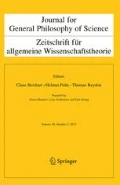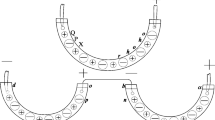Abstract
In this paper, I analyze some disagreements about scientific ontology as cases of disagreement between epistemic peers. I maintain that the particularities of these cases are better understood if epistemic peerhood is relativized to a perspective-like index of epistemic goals and values. Taking the debate on the metaphysics of laws of nature as a case study, I explore the limits and possibilities of a trans-perspective assessment of positions regarding scientific ontology.
Similar content being viewed by others
Notes
One of the main intended contributions of this work is to articulate the idea that features of disagreements about scientific ontology can be explained by relativizing epistemic peerhood to a perspective-like index. The strategy of relativizing information to indexes can be also tracked in philosophy of language; it stems from Lewis (1980), and has been developed by Recanati (2007). The contemporary debate discusses whether the information placed in the indexes belongs to what is said, and different answers have given rise to different proposals: indexical contextualism, non-indexical contextualism, and relativism.
For the purposes of this paper it will be enough to adopt a general notion of disagreement, such as the one proposed by Kölbel (2004, 305): two parties disagree if one could not rationally accept what the other says without changing her mind. However, more fine-grained notions of disagreement were presented by MacFarlane (2014, Ch. 6) in order to account for some features of disagreement in disputes of taste.
Some issues about the notion of rationality in the context of the disputes about PD will be addressed in Sect. 3.1.
I have slightly modified White’s formulation of the principle adding the possibility of a maximality condition, the rest the phrasing is identical with the reference.
Cases of faultless disagreement are often associated with matters of taste or aesthetic intuitions (see for example Kölbel 2003), but the steadfast view seems to motivate its extension to regular factual propositions (under the assumption that epistemic objectivism is false, see Sect. 4.2 for discussion).
This would imply a sort of incommensurability between epistemic perspectives (although not one of the same kind as the one described by Kuhn for scientific paradigms), and a degree of relativism regarding the epistemic goals of perspectives. However, it is important to note that what is relative to a given perspective is just the balance of the epistemic risk involved in emphasizing one of the canonical epistemic goals. This rules out the possibility of endorsing bizarre perspectives (e.g. one that prescribes believing only in false propositions).
Field (2000) has a convincing argument in favor of this kind of fundamentality for inductive methods that can be also applied in this context: If some empirical evidence could defeat a fundamental perspective, then we need a more general meta-rule or meta-perspective in light of which the evidence actually defeats it, but if that meta-perspective exists, then the initial perspective was not fundamental after all. Of course other kinds of considerations about a perspective can be regarded as “evidence” against its reliability, e.g. showing it to be self-defeating.
However, in personal conversation Chakravartty has pointed out that unlike epistemic perspectives, stances are something more robust than just a set of epistemic policies and a hierarchy of values directed towards some preferred epistemic goals. However it is worth noting that not being propositional entities, stances and epistemic perspectives lead to a specific type of disagreement that should be distinguished from Fogelin’s (1985) deep disagreement about basic or fundamental propositions.
The distinctions between Strong and Weak Epistemic Peer, and Weak and Strong Peer Disagreement were first advanced by Lo Guercio (2012, 462) and further developed in Borge & Lo Guercio (unpublished manuscript).
This includes the defenders of humean supervenience. Among them are some prominent scientific realists, such as David Lewis and Stathis Psillos. They all embrace strong metaphysical commitments (e.g. concrete possible worlds and mereological sums of regularities, in the cases mentioned) despite denying the existence of laws of nature.
This might sound like a vindication of conciliationism: since they cannot tell which perspective is objectively correct, they should be less confident of their own perspective and its products. For that reason, in the end, they should conciliate. However, this is not a good line of reasoning. The supposition regarding this point is that epistemic objectivism is true, not that the parties know nor believe that it is true (nor even that they think about it). But let us suppose that epistemic objectivism is true and that both parties know it is true. This does not replicate the problem raised by the SPD scenario in a higher level. Epistemic perspectives are immodest, that is, they should recommend themselves as the correct epistemic perspective on pain of contradiction. A disagreement about an epistemic perspective is not a piece of (meta)higher-evidence.
Even if revisions of the epistemic perspectives’ standards are not mandatory in a SPD situation, the fact that it might motivate such reexamination makes the eventual changes rational, at least in the minimum sense of having some reasons or motivations for them. In addition, the three proposed paths for a rational breakthrough are closely related to typical features of rational choice.
References
Armstrong, D. M. (2016). What is a law of nature? Cambridge: Cambridge University Press.
Ballantyne, N., & Coffman, E. J. (2012). Conciliationism and uniqueness. Australasian Journal of Philosophy, 90(4), 657–670.
Borge, B. & Lo Guercio, N. (unpublished manuscript). Learning from scientific and meta-scientific disagreement.
Brown, J. R. (1994). Smoke and mirrors: How science reflects reality. London and New York: Routledge.
Chakravartty, A. (2017). Scientific ontology: Integrating naturalized metaphysics and voluntarist epistemology. Oxford: Oxford University Press.
Christensen, D. (2007). Epistemology of disagreement: The good news. The Philosophical Review, 116(2), 187–217.
Christensen, D. (2009). Disagreement as evidence: The epistemology of controversy. Philosophy Compass, 4(5), 756–767.
Field, H. (2000). Apriority as an evaluative notion. In P. Boghossian & C. Peacocke (Eds.), New essays on the a priori (pp. 117–149). Oxford: Oxford University Press.
Fogelin, R. (1985). The logic of deep disagreements. Informal Logic, 7(1), 1–8.
Goldman, A. (2010). Epistemic relativism and reasonable disagreement. In R. Feldman & T. Warfield (Eds.), Disagreement (pp. 187–215). Oxford: Oxford University Press.
Huemer, M. (2000). Skepticism and the veil of perception. Lanham: Rowman & Littlefield.
James, W. (1897). The will to believe and other essays in popular philosophy. New York: Longmans Green.
Kelly, T. (2003). Epistemic rationality as instrumental rationality: A critique. Philosophy and Phenomenological Research, 66(3), 612–640.
Kelly, T. (2010). Peer disagreement and higher-order evidence. In R. Feldman & T. Warfield (Eds.), Disagreement (pp. 111–174). Oxford: Oxford University Press.
Kelly, T. (2014). Evidence can be permissive. In M. Steup, J. Turri, & E. Sosa (Eds.), Contemporary debates in epistemology (pp. 298–311). Hoboken, NJ: Wiley-Blackwell.
Kölbel, M. (2003). Faultless disagreement. Proceedings of the Aristotelian society, 104, 53–73.
Kölbel, M. (2004). Indexical relativism versus genuine relativism. International Journal of Philosophical Studies, 12(3), 297–313.
Laudan, L. (1990). Aimless epistemology? Studies in History and Philosophy of Science, 21(2), 315–322.
Lewis, D. (1971). Immodest inductive methods. Philosophy of Science, 38(1), 54–63.
Lewis, D. (1980). Index, context, and content. In S. Kanger & S. Öhman (Eds.), Philosophy and grammar (pp. 79–100). Dordrecht: Springer.
Lewis, D. (1986). Philosophical papers II. Oxford: Oxford University Press.
Lo Guercio, N. (2012). Philosophical peer disagreement. Logos & Episteme, 3(3), 459–467.
Lo Guercio, N. (2015) Desacuerdos entre Pares Epistémicos: Problemas y Soluciones. PhD Dissertation. Universidad de Buenos Aires.
Loewer, B. (1996). Humean supervenience. Philosophical Topics, 24, 101–126.
MacFarlane, J. (2014). Assessment sensitivity: Relative truth and its applications. New York: Oxford University Press.
Mumford, S. (2004). Laws in nature. London: Routledge.
Pollock, J. L. (1987). Epistemic norms. Synthese, 71(1), 61–95.
Recanati, F. (2007). Perspectival thought: A plea for (moderate) relativism. Oxford: Oxford University Press.
Rosen, G. (2001). Nominalism, naturalism, epistemic relativism. Noûs, 35, 69–91.
Schoenfield, M. (2014). Permission to believe: Why permissivism is true and what it tells us about irrelevant influences on belief. Noûs, 48(2), 193–218.
Tooley, M. (1977). The nature of laws. Canadian Journal of Philosophy, 74, 667–698.
Van Fraassen, B. (2002). The empirical stance. New Haven: Yale University Press.
Van Fraassen, B. (2008). Scientific representation: Paradoxes of perspective. Oxford: Oxford University Press.
Wedgwood, R. (2010). The moral evil demons. In R. Feldman & T. Warfield (Eds.), Disagreement (pp. 216–246). Oxford: Oxford University Press.
White, R. (2005). Epistemic permissiveness. Philosophical perspectives, 19(1), 445–459.
Acknowledgements
I am very grateful to the invited editors for inviting me to be part of this special issue. I thank Anjan Chakravartty and Nicolás Lo Guercio for their comments to this work, and for many illuminating conversations on related issues. Previous versions of this paper were presented at the WIP seminar of the BA-Logic Group (Argentinian Society for Philosophical Analysis, Buenos Aires), the V Workshop del Círculo de Buenos Aires (University of Buenos Aires, Argentina), the TeC seminar of the Department of Philosophy I (University of Granada, Spain), and the Workshop on Philosophy of Science: Current Debates (University of Chile, Chile). I thank each of the audiences for their helpful remarks, specially to Eduardo Barrio, Natalia Buacar, Otávio Bueno, Renato Cani, Manuel de Pinedo, María José García Encinas, Cristian Soto and Nerftalí Villanueva.
Funding
Funding was provided by Consejo Nacional de Investigaciones Científicas y Técnicas (CONICET, Argentina).
Author information
Authors and Affiliations
Corresponding author
Additional information
Publisher's Note
Springer Nature remains neutral with regard to jurisdictional claims in published maps and institutional affiliations.
Rights and permissions
About this article
Cite this article
Borge, B. Disagreement About Scientific Ontology. J Gen Philos Sci (2021). https://doi.org/10.1007/s10838-020-09542-2
Accepted:
Published:
DOI: https://doi.org/10.1007/s10838-020-09542-2




